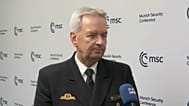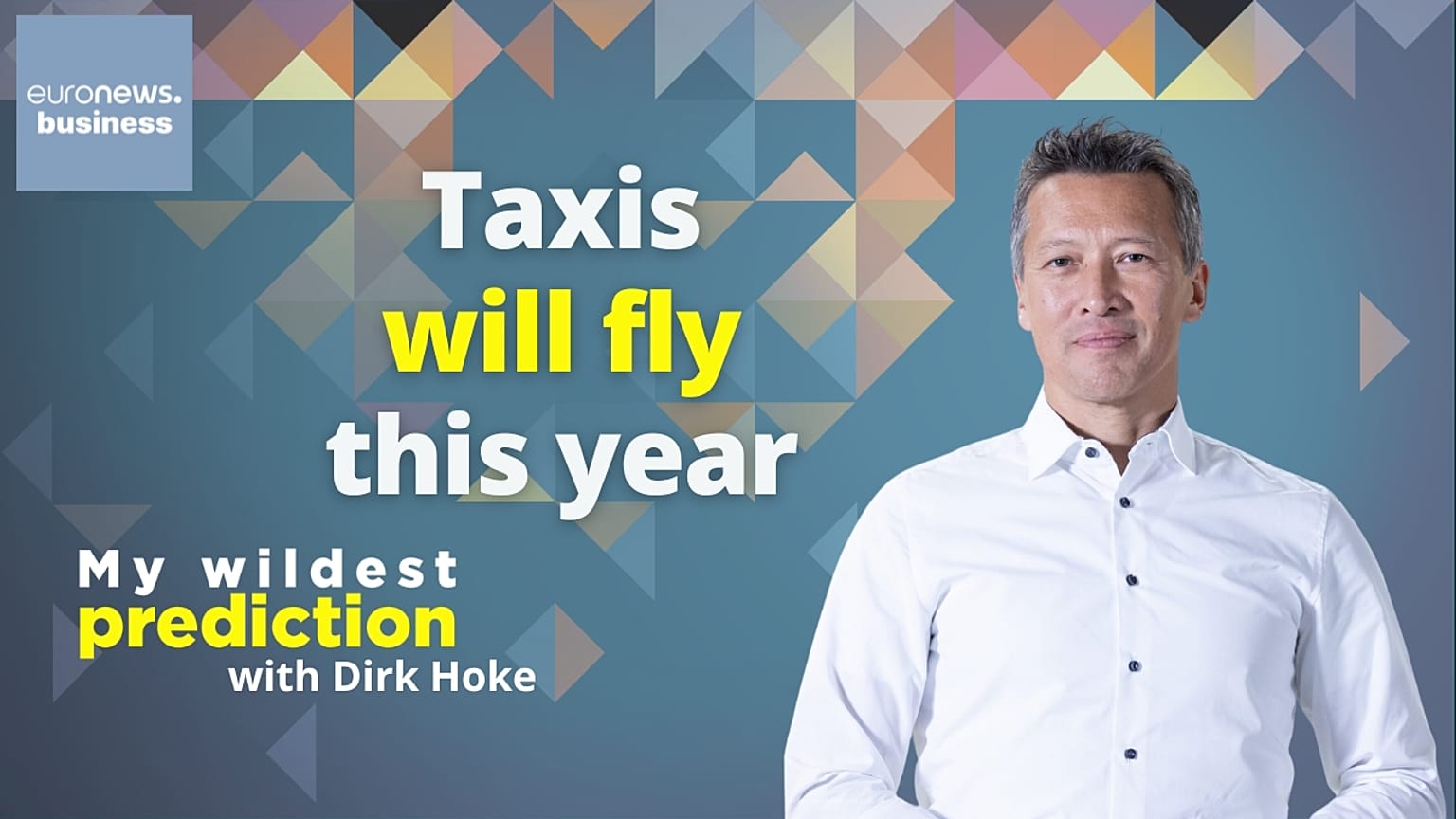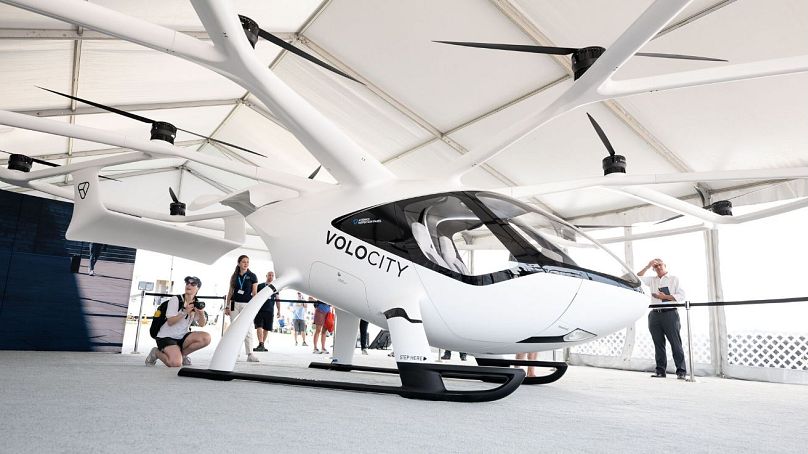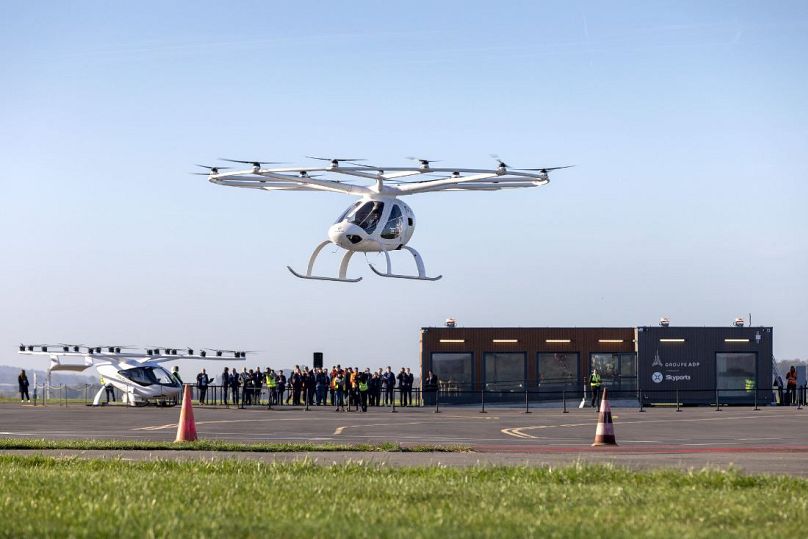While flying taxis may still sound like science fiction, they are poised to become a reality before the end of the year. Volocopter's drone-shaped electric vehicles are ready to take flight in Paris, coinciding with the 2024 Olympic Games.
Dirk Hoke, former CEO of Airbus Defense and Space, spearheads this groundbreaking initiative at Volocopter, a German start-up pioneering the introduction of electric air taxis to the market: the most disruptive revolution in urban mobility since the beginning of the century.
 ADVERTISEMENT
ADVERTISEMENT
 ADVERTISEMENT
ADVERTISEMENT
My Wildest Prediction is a podcast series from Euronews Business where we dare to imagine the future with business and tech visionaries. In this episode, Tom Goodwin talks with Dirk Hoke, CEO of Volocopter, about the future of urban mobility.
From science fiction to reality
Flying vehicles have long been a staple of science fiction films. In "The Fifth Element" (1997), a flying taxi engages in a thrilling car chase over the streets of a futuristic New York. Similarly, "Blade Runner" (1982) portrays flying cars, known as "spinners," dominating the skies of a futuristic Los Angeles in 2019. "Minority Report" (2002) depicts a 2054 future Washington where flying vehicles, including taxis, are a common sight.
However, this vision is on the brink of becoming a reality. "I think a lot of people believe it's not feasible or it will take decades," claims Dirk Hoke, CEO of Volocopter. "We will start commercial operation this year, not in 10 years."
Based in Germany, Volocopter is a start-up poised to launch the world's first-ever eVTOL services—Electric Vertical Takeoff and Landing aircraft. These electrically powered aircraft offer potential benefits in terms of noise, environmental impact, and cost compared to traditional aircraft, providing an innovative solution for navigating congested cities.
The first test flights will take place over the streets of Paris this summer, coinciding with the 2024 Olympic Games. These flights will connect Paris-Charles de Gaulle and Le Bourget airports, integrating into the city's busiest hub. Additionally, they will link the Austerlitz barge to Paris Heliport over urban areas and explore tourism routes to Saint-Cyr-l'École airfield.
"That gives us time to demonstrate to the population that it's safe and quiet, because I think whoever has lived in a mega city knows how stressful life is in the city, and you don't want to add stress factor," says Dirk Hoke.
However, he acknowledges that urban flying won't be for everyone. "It will not replace mass transportation," he says. "It will give individuals other options in case of bottlenecks and it will also have a huge use case in areas where today we use helicopters in cities which are much louder and not as safe".
"For example, for transportation of emergency medical service, bringing the doctor to an accident in a shorter time, or transporting organs to surgery, in a shorter time, more sustainably and quietly."
A drone meets a helicopter and an Uber
In "The Fifth Element," Bruce Willis's flying taxi resembles the iconic bright yellow mid-sized sedan taxis of New York City. However, Volocopter's taxis differ significantly in appearance from current taxis.
These vehicles are designed to fly between 20 and 30 km at a cruise speed of 90 to 100 km/h. "It's a multi-copter design specialized for flying in a city environment," says Hoke.
The VoloCity air taxi, resembling a hybrid between a drone and a helicopter, features two seats and 18 rotors, making it "remarkably easy to fly", according to Hoke.
However, there is a lack of pilots for this kind of vehicle. "As of today, we already do not have enough pilots for commercial aircraft. This scarcity represents a significant challenge, as the requisite scale, resources, and profiles are lacking worldwide."
Other challenges include battery technology, certifications, and public acceptance.
Hoke emphasises the importance of integration with other transportation modes, highlighting partnerships with entities like Uber and G7, Paris's largest taxi operator, to ensure smooth transitions for passengers.
"I believe that in this decade, we will be able to compete with taxis on the street," he adds.
He thinks that several factors will drive scaling. First, the progress in battery technology will decide how soon they can use bigger vehicles that can carry more passengers.
Secondly, integration into app-based traffic management systems will be crucial for overcoming current capacity limitations.
Hoke compares Volocopter's business case to the arrival of Uber.
"No one expected that it would be any in all the countries that you can imagine. But, in most of the cities right now, you can order Uber Taxi."
He believes people will soon realise flying taxis are "a nice addition to our life" and will be able to order one.






















